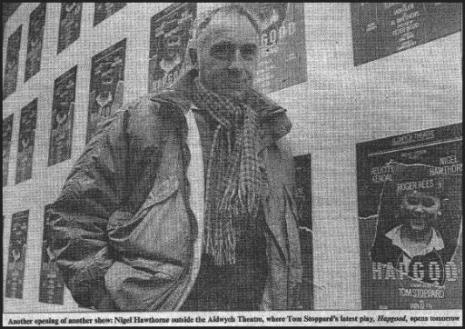












Life's equation solved

Nigel Hawthorne's whole career seems to have been a
struggle for dignity but now, he tells
Sheridan Morley, he feels a new confidence.
The Times, March 7 1988
"It's like playing chess without a board," says Nigel Hawthorne of the new Tom Stoppard espionage puzzle Hapgood, which opens at the Aldwych tomorrow and in which he co-stars with Felicity Kendal and Roger Rees under the direction of Peter Wood.
"There's a plot of hugely elaborate labrynthine complexity, set within the framework of physics. On the pre-London tour in Wimbledon we had a little trouble with an overcrowded grid, so we had to open without a full dress-rehearsal and on the first night there I stood on stage, frequently without the faintest idea of what was supposed to be happening next.
"But I stayed very calm and pretended it was all a dream: luckily Felicity went ploughing on, and although one or two people left in some bewilderment, it seemed to work out in the end."
This is not Hawthorne's first encounter with a Stoppard script, since he once toured as the Player in Rosencrantz and Guildenstern, but it is his first time back in the West End after a faintly unhappy year at the National: "I was there with The Magistrate which went very well, but there was also Jacobowsky and The Colonel and that wasn't quite so successful.
"Them seems to be no cohesion there at all: Peter Hall never once gathered us together or talked to us as though we were a real company working together, and I felt somehow very cut off from whatever else was going on there. Also, you have those impossible three-week gaps between performances, so it's like a first night every time you do the play.
"Television is just so much easier, but now that I get my name up in lights because of Yes Minister, people do seem quite keen to have a look at me in the flesh from time to time."
It was in 1951 that Hawthorne, then just 21, joined an acting company in his native Cape Town where one of the other players happened to be the BBC producer Shaun Sutton: "He encouraged me to try my luck in England, so when I arrived at Waterloo with �12, just off the boat train, he was the one who had to find me work as an assistant stage-manager in Buxton. After that things got no better, and by 1957, when I couldn't even find work as an understudy, I decided it was time to go home again in defeat."
Once back in Cape Town, he began to get parts that would never have been available to him in Britain. "I played a lot of O'Neill and Cocteau and Pinter, and we did the first-ever overseas production of Beyond The Fringe, which I had to type out from the long-playing record because we couldn't find a script. It was only when I saw the original show in London a year later that I realized how much of it I'd got wrong by mishearing jokes on the record.
"I long to say that I left South Africa again in the early 1960s for political reasons, but actually it was because I still wanted to how good I was in the theatre and I knew that meant London rather than Cape Town. So I came back and got into Joan Littlewood's Theatre Workshop because she was looking for officer material for a tour of Oh What A Lovely War!.
"I played Haig all over Europe and then Bill Gaskill took me to the Royal Court for Bond's Early Morning and the first Christopher Hampton, Total Eclipse, which led to my taking over from George Cole in his The Philanthropist.
"From then on I did manage to stay in regular work, though as they never show any BBC series in South Africa my parents never knew that at last I'd made it. But I still have brothers and sisters out there, so I go back there occasionally and I work with Janet Suzman on various anti-apartheid projects. South Africa is the most selfish of societies and with the worst double standards; but then, as with Israel, you go there and find that same mix of wonderful people and appalling politicians.
"I feel a little sad that my family have no real idea of what I'm doing: I did once take my mother a tape of Yes Minister which she found thoroughly confusing, but after so many years of not doing terribly well and having to make all the old family excuses about "having an audition next week" I did want her to know that it had worked out all right in the end.
"Not that we'll be doing any more Yes Ministers: we've done a total of 40, and I think all of us are afraid of having it go stale or run downhill: I just wish it had happened to me a bit earlier. My whole career seems to have been a struggle for dignity and justification, to prove that I'd made the right decision to be an actor in the first place.
"And now at 59, although I'm appalled by the idea of making any definite plans for the future, I would maybe love to try a Malvolio. I've a confidence now that was never there before: at last I seem to have got myself well-balanced, and I'm very grateful for that.
